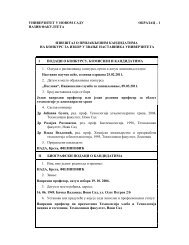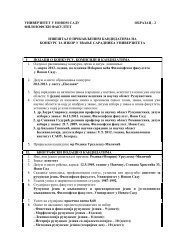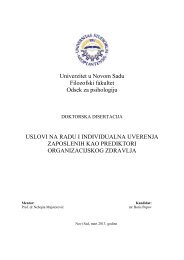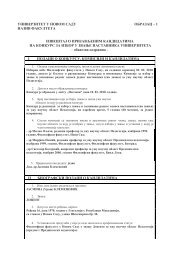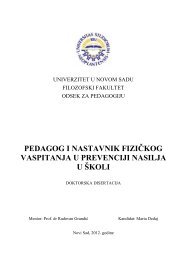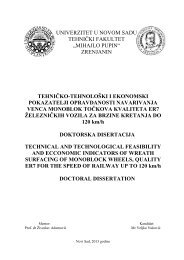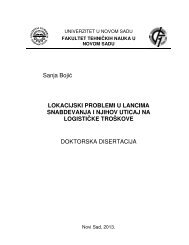Intercultural competence as an aspect of the communicative ...
Intercultural competence as an aspect of the communicative ...
Intercultural competence as an aspect of the communicative ...
Create successful ePaper yourself
Turn your PDF publications into a flip-book with our unique Google optimized e-Paper software.
put forth not only definitions but whole models <strong>of</strong> ICC which are discussed in a separate<br />
section.<br />
2.3.4. Criticism <strong>of</strong> ICC definitions<br />
Since ICC is a complex concept, it is no wonder that authors <strong>an</strong>d researchers do<br />
not always agree on its conceptualization. Some even claim that <strong>the</strong> term h<strong>as</strong> become ‘<strong>an</strong><br />
educational cliché […] f<strong>as</strong>hionable to use, although no one seems to know exactly what it<br />
me<strong>an</strong>s’ (Simensen 2003 <strong>as</strong> cited in Lund 2008).<br />
Some authors (Bennett 1998; V<strong>an</strong> de Vijver, Leung 2009) would argue that<br />
intercultural <strong>competence</strong> relies mostly on personal characteristics. They list attitudes or<br />
orientations (attitudes toward o<strong>the</strong>r cultures <strong>an</strong>d diversity in <strong>an</strong> org<strong>an</strong>ization or country),<br />
personality traits (cultural empathy <strong>an</strong>d emotional intelligence), skills relev<strong>an</strong>t in crosscultural<br />
encounters (negotiation skills <strong>an</strong>d m<strong>as</strong>tery <strong>of</strong> relev<strong>an</strong>t l<strong>an</strong>guages) <strong>an</strong>d actual<br />
behaviour in intercultural encounters <strong>as</strong> some <strong>of</strong> <strong>the</strong>m. Bennett emph<strong>as</strong>izes <strong>the</strong><br />
import<strong>an</strong>ce <strong>of</strong> subjective culture over objective for successful intercultural interaction.<br />
However, if this were so, <strong>the</strong>n <strong>an</strong>y research would be cumbersome <strong>an</strong>d long <strong>an</strong>d probably<br />
would not include enough <strong>of</strong> background data to justify or explain particular behaviours.<br />
There are scholars who criticize <strong>the</strong> definitions <strong>of</strong> intercultural <strong>competence</strong> which<br />
personify culture, <strong>as</strong> individuals meet o<strong>the</strong>r individuals in <strong>the</strong> context <strong>of</strong> culture, <strong>an</strong>d not<br />
<strong>the</strong> culture itself (Dervin 2010; H<strong>an</strong>nerz 2001; Wik<strong>an</strong> 2002). H<strong>of</strong>stede claims that<br />
cultures ‘are wholes, <strong>an</strong>d <strong>the</strong>ir internal logic c<strong>an</strong>not be understood in terms used for <strong>the</strong><br />
personality dynamics <strong>of</strong> individuals’ (H<strong>of</strong>stede 2001: 17). With this criticism, scholars<br />
also point out to <strong>the</strong> fact that cultures are presented <strong>as</strong> singular, that is, that when a learner<br />
faces a particular situation in <strong>an</strong>o<strong>the</strong>r culture, <strong>the</strong> presupposition is that <strong>the</strong>re have not<br />
been <strong>an</strong>y previous c<strong>as</strong>es <strong>of</strong> mixing, encountering <strong>of</strong> cultures, which is, more <strong>of</strong>ten th<strong>an</strong><br />
not, unlikely.<br />
The definitions <strong>of</strong> ICC may point to <strong>the</strong> feeling <strong>of</strong> cultural homogeneity,<br />
especially those that have <strong>the</strong>ir roots in <strong>the</strong> positivist paradigm (Boumard 2006 <strong>as</strong> cited in<br />
Dervin 2010: 162) <strong>an</strong>d might suggest a ‘superadaptation’ when interculturality takes<br />
place. It would seem that a learner would acquire a system <strong>of</strong> fixed cultural elements<br />
which would allow <strong>the</strong>m to communicate with <strong>the</strong> speakers <strong>of</strong> a particular culture (Dervin<br />
2010). However, in one’s own culture <strong>the</strong>re are m<strong>an</strong>y encounter with very different<br />
people, so intercultural encounters c<strong>an</strong>not be simplified in that way.<br />
61



